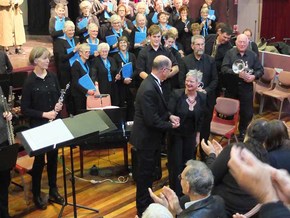In the midst of the Anzac centenary craziness, Larry Hills’ local cantata proved to be the perfect antidote.
By Catherine Watson
May 2, 2015
I WAS in the city last Saturday and observed the festivity of the crowds lining the streets for the Anzac event. A jeweller’s window displayed poppies among the glittering rings and bracelets. A cheerful voice over the Flinders Street Station public address system commanded us: “Enjoy your Anzac weekend”.
I was well and truly over the whole Anzac thing by the time I headed to Foster last Sunday for the third and final performance of Larry Hills’ Anzac cantata They Went with Songs.
It turned out to be exactly what I needed, an antidote to the Anzac centenary craziness: serious without being over-solemn or pompous; compassionate without being nationalistic or sentimental.
There's not a mention of heroes dying for Australia; instead it's about ordinary blokes and the families who waved them off, worried about them, welcomed them home. The song cycle follows the narrative of a local country boy who enlists, goes off to war, endures the horrors of life at the front, and returns to try to pick up his old life.
Composer/conductor Larry Hills congratulates pianist Carmel Slater following the final performance of They Went With Songs.
Hills based some of the lyrics on letters and diaries written by young soldiers in WW1, but most were taken from existing works. The work opened with the optimism of Vance Palmer’s They Went with Songs and moved inexorably through the joy of The Homecoming towards Palmer's bleak poem of return, The Soldier Remembers the Somme.
The songs were gloriously rendered by 90 voices made up from three local choirs, the Bass Coast Chorale, the South Gippsland Singers and the Prom Coast Singers, and soloists Tim Gessell and Brad Boucher.
There were many fine songs in a variety of styles and moods – excited, despondent, fearful, humorous, funereal, ecstatic, elegaic. Everyone had a favourite, but the one that touched a chord with many people was at first glance the slightest of songs. Hills took the words for The Magpie from the war diary of Private Ivan Walker, writing on the front line on January 27, 1916:
I remember the last bird I heard sing. It was a Magpie;
That Magpie at the Broadmeadows camp.
He’s a good honest bird. And I look to the time
When I shall hear him in Australia again.
The cantata ended with the familiar ode For the Fallen, recited at every Anzac service for most of a century. This time it was different: the past hour had restored meaning to the old familiar words and I heard them anew.
The cumulative effect was intense. By the end of They Went with Songs, I was on the edge of my seat and hanging on every word and note. If it felt like this in the audience, I can only imagine how thrilling it must have been to be a member of the choir or orchestra.
May 2, 2015
I WAS in the city last Saturday and observed the festivity of the crowds lining the streets for the Anzac event. A jeweller’s window displayed poppies among the glittering rings and bracelets. A cheerful voice over the Flinders Street Station public address system commanded us: “Enjoy your Anzac weekend”.
I was well and truly over the whole Anzac thing by the time I headed to Foster last Sunday for the third and final performance of Larry Hills’ Anzac cantata They Went with Songs.
It turned out to be exactly what I needed, an antidote to the Anzac centenary craziness: serious without being over-solemn or pompous; compassionate without being nationalistic or sentimental.
There's not a mention of heroes dying for Australia; instead it's about ordinary blokes and the families who waved them off, worried about them, welcomed them home. The song cycle follows the narrative of a local country boy who enlists, goes off to war, endures the horrors of life at the front, and returns to try to pick up his old life.
Composer/conductor Larry Hills congratulates pianist Carmel Slater following the final performance of They Went With Songs.
Hills based some of the lyrics on letters and diaries written by young soldiers in WW1, but most were taken from existing works. The work opened with the optimism of Vance Palmer’s They Went with Songs and moved inexorably through the joy of The Homecoming towards Palmer's bleak poem of return, The Soldier Remembers the Somme.
The songs were gloriously rendered by 90 voices made up from three local choirs, the Bass Coast Chorale, the South Gippsland Singers and the Prom Coast Singers, and soloists Tim Gessell and Brad Boucher.
There were many fine songs in a variety of styles and moods – excited, despondent, fearful, humorous, funereal, ecstatic, elegaic. Everyone had a favourite, but the one that touched a chord with many people was at first glance the slightest of songs. Hills took the words for The Magpie from the war diary of Private Ivan Walker, writing on the front line on January 27, 1916:
I remember the last bird I heard sing. It was a Magpie;
That Magpie at the Broadmeadows camp.
He’s a good honest bird. And I look to the time
When I shall hear him in Australia again.
The cantata ended with the familiar ode For the Fallen, recited at every Anzac service for most of a century. This time it was different: the past hour had restored meaning to the old familiar words and I heard them anew.
The cumulative effect was intense. By the end of They Went with Songs, I was on the edge of my seat and hanging on every word and note. If it felt like this in the audience, I can only imagine how thrilling it must have been to be a member of the choir or orchestra.
